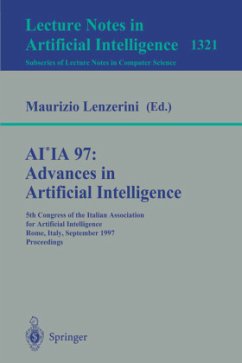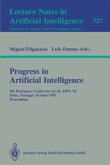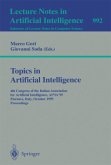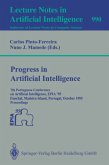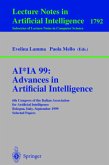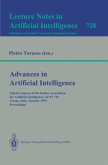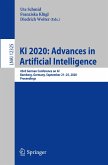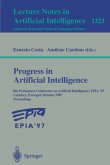Lenzerini5th Congress of the Italian Association for Artificial Intelligence, Rome, Italy, September 17-19, 1997, Proceedings
AI*IA 97: Advances in Artificial Intelligence
5th Congress of the Italian Association for Artificial Intelligence, Rome, Italy, September 17-19, 1997, Proceedings
Herausgegeben:Lenzerini, Maurizio
Lenzerini5th Congress of the Italian Association for Artificial Intelligence, Rome, Italy, September 17-19, 1997, Proceedings
AI*IA 97: Advances in Artificial Intelligence
5th Congress of the Italian Association for Artificial Intelligence, Rome, Italy, September 17-19, 1997, Proceedings
Herausgegeben:Lenzerini, Maurizio
- Broschiertes Buch
- Merkliste
- Auf die Merkliste
- Bewerten Bewerten
- Teilen
- Produkt teilen
- Produkterinnerung
- Produkterinnerung
This book constitutes the refereed proceedings of the 5th Congress of the Italian Association for Artificial Intelligence, AI_IA 97, held in Rome, Italy, in September 1997. The 37 revised full papers and 8 system descriptions presented in the volume were selected from 88 papers submitted. The papers are organized in topical sections on machine learning; natural language processing; perception, vision and robotics; distributed artificial intelligence; and planning.
Andere Kunden interessierten sich auch für
![Progress in Artificial Intelligence Progress in Artificial Intelligence]() FilgueirasProgress in Artificial Intelligence39,99 €
FilgueirasProgress in Artificial Intelligence39,99 €![Topics in Artificial Intelligence Topics in Artificial Intelligence]() GoriTopics in Artificial Intelligence39,99 €
GoriTopics in Artificial Intelligence39,99 €![Progress in Artificial Intelligence Progress in Artificial Intelligence]() Pinto-FerreiraProgress in Artificial Intelligence39,99 €
Pinto-FerreiraProgress in Artificial Intelligence39,99 €![AI*IA 99:Advances in Artificial Intelligence AI*IA 99:Advances in Artificial Intelligence]() Evelina Lamma / Paolo Mello (eds.)AI*IA 99:Advances in Artificial Intelligence38,99 €
Evelina Lamma / Paolo Mello (eds.)AI*IA 99:Advances in Artificial Intelligence38,99 €![Advances in Artificial Intelligence Advances in Artificial Intelligence]() TorassoAdvances in Artificial Intelligence39,99 €
TorassoAdvances in Artificial Intelligence39,99 €![KI 2020: Advances in Artificial Intelligence KI 2020: Advances in Artificial Intelligence]() KI 2020: Advances in Artificial Intelligence38,99 €
KI 2020: Advances in Artificial Intelligence38,99 €![Progress in Artificial Intelligence Progress in Artificial Intelligence]() CostaProgress in Artificial Intelligence39,99 €
CostaProgress in Artificial Intelligence39,99 €-
-
-
This book constitutes the refereed proceedings of the 5th Congress of the Italian Association for Artificial Intelligence, AI_IA 97, held in Rome, Italy, in September 1997.
The 37 revised full papers and 8 system descriptions presented in the volume were selected from 88 papers submitted. The papers are organized in topical sections on machine learning; natural language processing; perception, vision and robotics; distributed artificial intelligence; and planning.
The 37 revised full papers and 8 system descriptions presented in the volume were selected from 88 papers submitted. The papers are organized in topical sections on machine learning; natural language processing; perception, vision and robotics; distributed artificial intelligence; and planning.
Produktdetails
- Produktdetails
- Lecture Notes in Computer Science 1321
- Verlag: Springer / Springer Berlin Heidelberg / Springer, Berlin
- Artikelnr. des Verlages: 978-3-540-63576-5
- 1997.
- Seitenzahl: 480
- Erscheinungstermin: 3. September 1997
- Englisch
- Abmessung: 235mm x 155mm x 26mm
- Gewicht: 615g
- ISBN-13: 9783540635765
- ISBN-10: 3540635769
- Artikelnr.: 09241091
- Herstellerkennzeichnung
- Springer-Verlag KG
- Sachsenplatz 4-6
- 1201 Wien, AT
- ProductSafety@springernature.com
- Lecture Notes in Computer Science 1321
- Verlag: Springer / Springer Berlin Heidelberg / Springer, Berlin
- Artikelnr. des Verlages: 978-3-540-63576-5
- 1997.
- Seitenzahl: 480
- Erscheinungstermin: 3. September 1997
- Englisch
- Abmessung: 235mm x 155mm x 26mm
- Gewicht: 615g
- ISBN-13: 9783540635765
- ISBN-10: 3540635769
- Artikelnr.: 09241091
- Herstellerkennzeichnung
- Springer-Verlag KG
- Sachsenplatz 4-6
- 1201 Wien, AT
- ProductSafety@springernature.com
Modelling conceptual change: An interdisciplinary approach.- Refining numerical terms in horn clauses.- Handling continuous data in top-down induction of first-order rules.- Inductive inference of tree automata by recursive neural networks.- A computational model of misunderstandings in Agent Communication.- Wide-Coverage lexicalized grammars.- Flexible response choice using problem-solving plans and rhetorical relations.- A variant of Earley parsing.- Autonomous robot navigation using a reactive agent.- A hybrid architecture for autonomous agents.- 3-D Facets construction for stereovision.- Extraction of discriminant features from image fractal encoding.- Learning relational concepts at different levels of granularity.- Inferring minimal rule covers from relations.- Corpus-driven unsupervised learning of verb subcategorization frames.- Learning the syntax and semantic rules of an ECG grammar.- Introducing abduction into (Extensional) inductive logic programming systems.- An efficient algorithm for temporal abduction.- Experimental analysis of the computational cost of evaluating Quantified Boolean Formulae.- A proof theory for tractable approximations of propositional reasoning.- Embedding minimal knowledge into autoepistemic logic.- User model-based information filtering.- A comparative analysis of Horn models and Bayesian Networks for diagnosis.- Multi-agent negotiation and planning through knowledge contextualization.- From task delegation to role delegation.- Automated reasoning on-board autonomous spacecraft.- A weakly backjumping strategy to solve hard scheduling problems.- Compiling task networks into partial order planning domains.- A hybrid approach to hypertext generation.- Generating user-adapted hypermedia from discourse plans.- WordNet for Italian and itsuse for lexical discrimination.- Efficient support for reactive rules in prolog.- Reasoning with behavioural knowledge in application domain models.- How to solve qualification and ramification using Dijkstra's semantics for programming languages.- Towards a qualitative Representation of Linguistic Negation of Nuanced Properties.- CBET: A Case Base Exploration Tool.- Learning feature weights for CBR: Global versus local.- CompAss: A system for plans of study compilation.- A prototypal system for data-validation.- ODB-Tools: A description logics based tool for schema validation and semantic query optimization in object oriented databases.- Processing paper documents with WISDOM.- REGAL3.2: FOL concept learning by cooperative genetic algorithms.- IDL: A prototypical intelligent digital library service.- An object-oriented architecture for the DRS scheduling problem.- MASMA: A personal assistant for meetings management.
Modelling conceptual change: An interdisciplinary approach.- Refining numerical terms in horn clauses.- Handling continuous data in top-down induction of first-order rules.- Inductive inference of tree automata by recursive neural networks.- A computational model of misunderstandings in Agent Communication.- Wide-Coverage lexicalized grammars.- Flexible response choice using problem-solving plans and rhetorical relations.- A variant of Earley parsing.- Autonomous robot navigation using a reactive agent.- A hybrid architecture for autonomous agents.- 3-D Facets construction for stereovision.- Extraction of discriminant features from image fractal encoding.- Learning relational concepts at different levels of granularity.- Inferring minimal rule covers from relations.- Corpus-driven unsupervised learning of verb subcategorization frames.- Learning the syntax and semantic rules of an ECG grammar.- Introducing abduction into (Extensional) inductive logic programming systems.- An efficient algorithm for temporal abduction.- Experimental analysis of the computational cost of evaluating Quantified Boolean Formulae.- A proof theory for tractable approximations of propositional reasoning.- Embedding minimal knowledge into autoepistemic logic.- User model-based information filtering.- A comparative analysis of Horn models and Bayesian Networks for diagnosis.- Multi-agent negotiation and planning through knowledge contextualization.- From task delegation to role delegation.- Automated reasoning on-board autonomous spacecraft.- A weakly backjumping strategy to solve hard scheduling problems.- Compiling task networks into partial order planning domains.- A hybrid approach to hypertext generation.- Generating user-adapted hypermedia from discourse plans.- WordNet for Italian and itsuse for lexical discrimination.- Efficient support for reactive rules in prolog.- Reasoning with behavioural knowledge in application domain models.- How to solve qualification and ramification using Dijkstra's semantics for programming languages.- Towards a qualitative Representation of Linguistic Negation of Nuanced Properties.- CBET: A Case Base Exploration Tool.- Learning feature weights for CBR: Global versus local.- CompAss: A system for plans of study compilation.- A prototypal system for data-validation.- ODB-Tools: A description logics based tool for schema validation and semantic query optimization in object oriented databases.- Processing paper documents with WISDOM.- REGAL3.2: FOL concept learning by cooperative genetic algorithms.- IDL: A prototypical intelligent digital library service.- An object-oriented architecture for the DRS scheduling problem.- MASMA: A personal assistant for meetings management.

